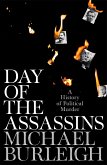'Written with Burleigh's characteristic brio, with pithy summaries of historical moments (he is brilliant on the Americans in Vietnam, for example) and full of surprising vignettes' - The Times 'Book of the Week'
In Day of the Assassins, acclaimed historian Michael Burleigh examines assassination as a special category of political violence and asks whether, like a contagious disease, it can be catching.
Focusing chiefly on the last century and a half, Burleigh takes readers from Europe, Russia, Israel and the United States to the Congo, India, Iran, Laos, Rwanda, South Africa and Vietnam. And, as we travel, we revisit notable assassinations, among them Leon Trotsky, Hendrik Verwoerd, Juvénal Habyarimana, Indira Gandhi, Yitzhak Rabin and Jamal Khashoggi.
Combining human drama, questions of political morality and the sheer randomness of events, Day of the Assassins is a riveting insight into the politics of violence.
'Brilliant and timely . . . Our world today is as dangerous and mixed-up as it has ever been. Luckily we have Michael Burleigh to help us make sense of it.' - Mail on Sunday
In Day of the Assassins, acclaimed historian Michael Burleigh examines assassination as a special category of political violence and asks whether, like a contagious disease, it can be catching.
Focusing chiefly on the last century and a half, Burleigh takes readers from Europe, Russia, Israel and the United States to the Congo, India, Iran, Laos, Rwanda, South Africa and Vietnam. And, as we travel, we revisit notable assassinations, among them Leon Trotsky, Hendrik Verwoerd, Juvénal Habyarimana, Indira Gandhi, Yitzhak Rabin and Jamal Khashoggi.
Combining human drama, questions of political morality and the sheer randomness of events, Day of the Assassins is a riveting insight into the politics of violence.
'Brilliant and timely . . . Our world today is as dangerous and mixed-up as it has ever been. Luckily we have Michael Burleigh to help us make sense of it.' - Mail on Sunday
Day of the Assassins is written with Burleigh's characteristic brio, with pithy summaries of historical moments (he is brilliant on the Americans in Vietnam, for example) and full of surprising vignettes, which he handles with a commendable sang-froid. David Aaronovitch 'Book of the Week' The Times








